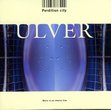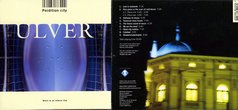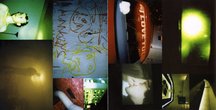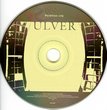 Norway - Full Moon 164 - 01/30/10
Norway - Full Moon 164 - 01/30/10
It's a label showdown!
Metronomicon Audio vs. Jester Records - Round 7

 Center of the Universe: Taking a Nap With
Center of the Universe: Taking a Nap With
(2001 Metronomicon Audio: MEAU.0007.CDR)
vs.
Ulver: Perdition City
(2000 Jester Records TRICK-007 - CD)
Welcome to round 7 in the label showdown series between Metronomicon Audio and Jester Records!
Since we've more or less totally missed out on reviewing the output of these two great labels, we are going
through their entire catalogues, matching the releases from each label consecutively against each other.
Humorously counting goals and giving out yellow
and giving out yellow and red
and red cards, soccer style -
but first of all reviewing the music. For more introductory information on this label match, see
round 1. cards, soccer style -
but first of all reviewing the music. For more introductory information on this label match, see
round 1.
Match preview
We believe that Taking a Nap With the C.O.U. is presented in the typical Metronomicon fashion - a CD-R packed
in a flexible plastic sleeve with inserts, and a booklet containing art and the lyrics. We have never seen it though.
Thanks to Jørgen Skjulstad (Mr. Metronomicon and C.O.U.'s main man) for providing the MP3 files of the album for this review!
The Ulver release comes in a jewel case and includes a folded insert with art, info & lyrics.




The match
Ulver's explorations of new sounds continues. The first minutes of "Lost in Moments" even introduces a saxophone, lushly played by
Rolk Erik Nystrø, in a way that makes me think of the Norwegian 80's "underworld" detective
flick Blackout. Although not a very good movie, it did try to convey some
of the same disillusioned feeling of sadness and beauty that is suggested here.
The saxophone returns on "Dead City Centres", which after a submarine intro, enters a swing theme with film noir style narration,
reminiscent of John Zorn's Spillane  . .
Otherwise the music here is based on slower, electronic, mostly hip hop style rhythmic themes,
interspersed with more atmospheric, partly ambient bits. This way of producing dynamics within songs is
perhaps overused ("Hallways of Always", "Tomorrow Never Knows")  , but overall Ulver lay out
their very own quite intriguing technological wasteland , but overall Ulver lay out
their very own quite intriguing technological wasteland  , upon where they add more "organic" instruments like piano and saxophone, and
occasionally the human voice, creating their by now familiar "biomechanical" melancholy.
Sometimes they sound like Portishead ("Porn Piece of the Scars of Cold Kisses"), but
the overall content of Ulver's music is probably too eerie for chill-out sessions. That is, unless
you find staring into an existential black hole comforting. After all, the album title means
something like "utter destruction city" or "eternal damnation city", and with song titles
like "We are the Dead" and "Nowhere/Catastrophe" you are warned. , upon where they add more "organic" instruments like piano and saxophone, and
occasionally the human voice, creating their by now familiar "biomechanical" melancholy.
Sometimes they sound like Portishead ("Porn Piece of the Scars of Cold Kisses"), but
the overall content of Ulver's music is probably too eerie for chill-out sessions. That is, unless
you find staring into an existential black hole comforting. After all, the album title means
something like "utter destruction city" or "eternal damnation city", and with song titles
like "We are the Dead" and "Nowhere/Catastrophe" you are warned.
Some light and beauty shines through though, like in the middle of "The Future Sound of Music", where
an angelic choir appears, like the passing of the Elves in The Lord of the Rings, with darkness
lurking around. It's like if there is anything good happening, any sign of light, it's seen through the
rear view mirror - ahead lies nothing   . Can there be a happy ending in Perdition City? The closing "Nowhere/Catastrophe" suggests
probably not: "And your personality fades away; your features evaporate, your body decomposes;
and your last thought is that you have become a noise; a thin, nameless noise among all the others; Howling in the empty dark room". . Can there be a happy ending in Perdition City? The closing "Nowhere/Catastrophe" suggests
probably not: "And your personality fades away; your features evaporate, your body decomposes;
and your last thought is that you have become a noise; a thin, nameless noise among all the others; Howling in the empty dark room".
The booklet included contains a transcript of a conversation between S and G, showing most of all that Ulver
like to intellectualize their work. Nothing wrong with that, but I gather their average listener,
me included, will find it a bit hard to come to grips with Ulver's philosophical ambitions.
Lyrically and conceptually this is a really depressing journey  , if you take it all to heart.
But musically it's more dualistic, and more varied.
Dark, for sure, but experimental, and with a clear direction, and much beneath the surface , if you take it all to heart.
But musically it's more dualistic, and more varied.
Dark, for sure, but experimental, and with a clear direction, and much beneath the surface  .
To sum it up: Ulver have left extreme metal suburbia for good and found a new home in experimental trip hop dystopia.
To be continued ... .
To sum it up: Ulver have left extreme metal suburbia for good and found a new home in experimental trip hop dystopia.
To be continued ...
Out of the black and into the blue. Taking a Nap With the Center of the Universe feels quite comforting
after a tour of Perdition City. (These albums complement each other nicely, as they are extreme opposites in many ways.)
This is the most mellow release from C.O.U. so far, you may almost call it a collection of lullabies.
The opening "Not Even a Trace or a Shade of a Thought" is simply exquisite with its
beautiful melody and guitar playing. Soundwise it's a step away
from the typically dry closet-like earlier productions, adding space,
especially to the nicely played accompanying guitar.
Together with the lush keyboard and folky flute this song
easily becomes one of my favourite C.O.U. tunes so far  .
Even the singing is mostly in tune.
The next track, "It's Not the Meaning of Life, it's Just a Part of it",
goes back to a dryer production, and the singing is yet again out of key here and there .
Even the singing is mostly in tune.
The next track, "It's Not the Meaning of Life, it's Just a Part of it",
goes back to a dryer production, and the singing is yet again out of key here and there  .
The song itself is run-of-the-mill C.O.U., nice, but forgettable.
"In a Dream a Friend Gave Me a Key" continues in the same vein, but halfway through
it gets more interesting, with twin acoustic guitar solos and increasing use of reverb,
landing the song on the plus side. .
The song itself is run-of-the-mill C.O.U., nice, but forgettable.
"In a Dream a Friend Gave Me a Key" continues in the same vein, but halfway through
it gets more interesting, with twin acoustic guitar solos and increasing use of reverb,
landing the song on the plus side.
For some reason, the vocals on "I Throw a Stone into the Water" are very muddled, sounding like they
were recorded through a big ball of cotton. The result is annoying, like a person with a very severe
cold is singing to you inches from your face  . The song itself is again rather anonymoys.
After the short instrumental interlude of "Something is Disturbing Sissyfus' Daydreams",
the vocals become heavily distorted with "When the Moon is Like an Arrow, Pointing Where to Find You".
The interplay between the guitar and the soft keyboard is flowing along beautifully . The song itself is again rather anonymoys.
After the short instrumental interlude of "Something is Disturbing Sissyfus' Daydreams",
the vocals become heavily distorted with "When the Moon is Like an Arrow, Pointing Where to Find You".
The interplay between the guitar and the soft keyboard is flowing along beautifully  , ending
ending with a gypsy violin solo. Clearly another highlight of the album.
I also like the melancholy of "Tales are Often Held as Prisoners", but the edge of the sadness is somewhat
dulled by the coziness that often follows the C.O.U. songs and productions, as opposed to the purer melancholy
of the opening track. The lenghty ending title track
seems to be an improvisational piece with kind of new-age feeling, flowing around keyboard-based fumblings
that goes nowhere in particular.
To sum it up: C.O.U. has gone acoustic on this release, the arrangements are sparse, the songs are gentle and reflective.
An overall nice & cozy album, but only a couple of tracks really stand out here. Of these, "It's Not the Meaning of Life, it's Just a Part of it"
is on the other hand close to magical! , ending
ending with a gypsy violin solo. Clearly another highlight of the album.
I also like the melancholy of "Tales are Often Held as Prisoners", but the edge of the sadness is somewhat
dulled by the coziness that often follows the C.O.U. songs and productions, as opposed to the purer melancholy
of the opening track. The lenghty ending title track
seems to be an improvisational piece with kind of new-age feeling, flowing around keyboard-based fumblings
that goes nowhere in particular.
To sum it up: C.O.U. has gone acoustic on this release, the arrangements are sparse, the songs are gentle and reflective.
An overall nice & cozy album, but only a couple of tracks really stand out here. Of these, "It's Not the Meaning of Life, it's Just a Part of it"
is on the other hand close to magical!
Match result: Metronomicon Audio 2 (    ) - Jester Records 4 ( ) - Jester Records 4 (       ) )
Next match
Next head-to-head meeting is the Täppas Strepens album The Future Will Be Better Tomorrow release from Metronomicon Audio which is up against the
Bogus Blimp release Cords.wires from Jester Records.
Copyright © 2010 Knut Tore Breivik 
|

 Center of the Universe: Taking a Nap With
Center of the Universe: Taking a Nap With

